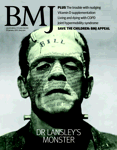
Celiac.com 02/25/2011 - In many parts of the world, recommendations by World Health Organization (WHO) regarding child nutrition are regarded as the scientific standard.
So, any time a major health organization comes out with recommendations that differ from those made by WHO, there is always much discussion about the science behind both sets of recommendations, and, occasionally, some intellectual and scientific jousting from both sides.
Celiac.com Sponsor (A12):
That was the case recently, when a magazine called BMJ (formerly the British Medical Journal) published new and controversial recommendations regarding breastfeeding.
According to an article by Susan Perry on MinnPost.com, those recommendations, the resulting criticism from WHO, and BMJ reviewers' response make some excellent points about issues of conflict of interest in research.
The recommendations by BMJ suggest that breast milk should be supplemented with solid foods starting around the age of four months, two months earlier than currently recommended by the World Health Organization (WHO). According to the reviewers, waiting to introduce solid foods increases a baby’s risk of developing anemia, food allergies and celiac disease.
Those recommendations brought a strong response from WHO, which noted that its own decade-long no-solid-foods-until-six-months recommendation is “based on evidence that the early introduction of solid food to babies increases the risk of infection and disease.” The response from WHO then proceeds to refute each argument made by the BMJ reviewers.
A response by Susan Perry to the spat appears on MinnPost.com, and makes some excellent points about issues of conflict of interest in research.
Now, this debate between WHO and BMJ is a bigger deal in certain places than in others. The United States never officially adopted the WHO recommendation, as did the U.K. in 2003.
Ironically, it seems that more American than British moms are following WHO standards. BMJ reviewers say that less than 1 percent of British mothers exclusively breastfeed their babies for six months. In the United States, that figure is 13 percent, as reported by the Centers for Disease Control and Prevention. However, that's a story for another day.
But, a strong rebuttal from WHO is not the only problem facing the authors of the new BMJ review. A more pressing problem for BMJ study is that three of the four authors admit that they took funding within the past three years from companies that manufacture infant formula and baby food.
Now, these researchers claim that their findings and recommendations are in no way influenced by their financial relationships with these companies:
"My colleagues and I are independent pediatricians and scientists, funded by universities or hospitals, and we received no funding for doing this review other than our normal salaries,” review author, Mary Fewtrell, a child nutritionist at University College London told NatureNews reporter Natasha Gilbert.
She adds that “all of us have had links with industry at some point. We are making no comment in our paper about what type of solid foods should be introduced — this could be home-prepared or commercial depending on the mum's choice — the main issue is that the food should be nutritionally adequate and safe."
But financial connection between study authors and industry cannot fail to raise legitimate questions about the independence of study findings. Moreover, such a relationship creates a cloud of potential doubt over the nature of the findings.
Indeed, the review itself indicates a strong desire within the baby food industry to get British health officials to change their current advice to mothers to breastfeed exclusively until six months if possible.
Survey data shows that British mothers are slowly pushing back the age at which they introduce solid foods to their babies.
Successive surveys since the 1970s show that nearly all UK infants receive solids by four months. The number in the 2000 survey, for example, was 85%. However, the 2005 figure drops to 51%, with mean age of introduction of solids at 19 weeks, a rise from 15 weeks in 2000.
In view of the higher reported rates of exclusive breast feeding to six months elsewhere in the West (more than 30% in Hungary and Portugal, for example), it seems likely that the impact of the UK recommendation will be greater in 2010 than in 2005. It is timely to consider whether such trends could influence health outcomes.
Susan Perry notes in her response that the study seems "extremely timely, therefore, for baby food companies to consider whether such trends are going to damage their bottom line — and to financially support, even if not always directly, the research efforts of "friendly" academics."
That’s one example of why researchers who accept money from industry should be prepared to have their studies, methodologies, data and recommendations questioned — along with their motives.
Source:
- Open Original Shared Link



.webp.30b5094ce3b33d46043754b744cacd43.webp)




Recommended Comments